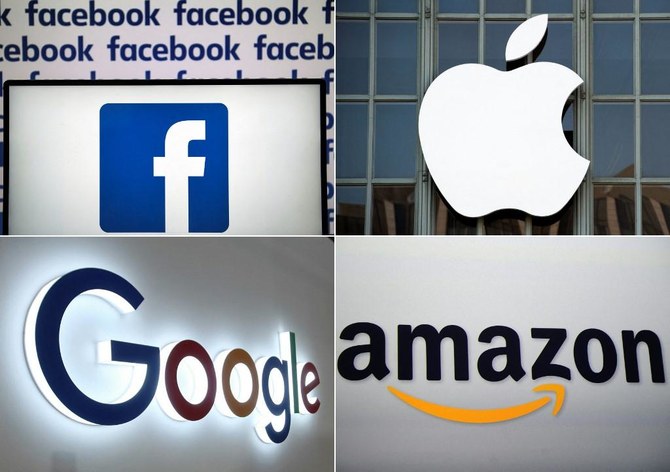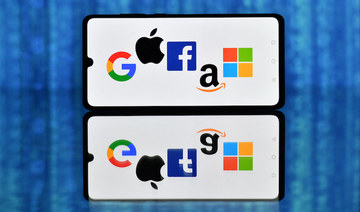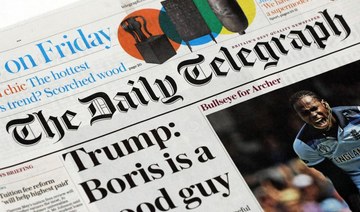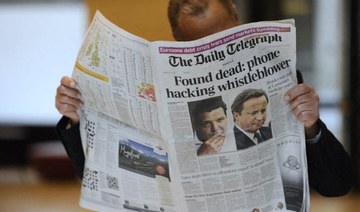WASHINGTON: The United States and European Union plan to take a more unified approach to limit the growing market power of Big Tech companies, according to a draft memo seen by Reuters.
The move will be among announcements on tech, climate, trade and supply chains likely to be made at a US-EU Trade & Technology Council meeting on Sept. 29 in Pittsburgh.
With the US and Europe trying to restrain the growing power of American tech giants such as Alphabet’s Google , Facebook, Apple and Amazonom Inc. , such cooperation has become critically important for regulators on both sides of the Atlantic — and would make it harder for the US tech industry to fight new rules.
This month, the White House announced that the council would meet for the first time on Sept. 29 in Pittsburgh. US Secretary of State Antony Blinken, Commerce Secretary Gina Raimondo, US Trade Representative Katherine Tai and the European Union’s trade chief Valdis Dombrovskis are scheduled to attend along with European Commissioner for Competition Margrethe Vestager.
The White House, which is coordinating with different agencies on the meeting, declined to comment on the memo. Apple, Facebook, Amazon and Google did not immediately respond to requests for comment.
The council has 10 working groups for areas such as strengthening trade, economic relations and shared democratic values, according to the draft memo.
The group focused on tech company regulation will “exchange information on our respective approaches to technology platform governance, seeking convergence where feasible,” the memo says.
There are many examples where the two continents could cooperate more. Google, which faces several antitrust lawsuits in the US related to its advertising business, also faces a wide-ranging investigation related to ad technology in the EU.
“We have identified common issues of concern around gatekeeper power by major platforms and the responsibility of online intermediaries,” the memo says, adding that more can be done to combat misinformation.
“This includes in particular the responsibility of online intermediaries to safeguard democratic processes from the impact of their business activities. Areas of common ground... include content moderation and fair competition,” the memo said.
The group will tackle areas such as hate speech, algorithmic amplification and data access for researchers, the memo says.
The council’s climate and clean tech group will work to identify trade and investment opportunities in low- and zero-carbon technologies and products, according to the memo. The supply chain working group will focus on securing supplies of pharmaceuticals, critical minerals and clean energy.
The council will also work to address the shortage of semiconductor chips in a way that is “balanced and of equal interest for both parties” and will avoid a “subsidy race.”
On Wednesday, Reuters reported that European Union ambassadors have postponed discussions to prepare for the meeting in protest of Washington’s submarine agreement with Australia at France’s expense.
A spokesperson for the White House’s National Security Council said preparations for the meeting were continuing.
Several tech trade groups in Washington said the industry does not want the European approach to digital regulation to be adopted in the United States.
“The risk is that the European side will press the United States to harmonize its regulations with the EU by taking a precautionary approach... which would skewer America’s leading tech companies,” said Robert Atkinson, president of the Information Technology & Innovation Foundation, a tech think tank based in Washington.
“We shouldn’t do that, nor do we need to. Our interests are broadly aligned and compatible, particularly when it comes to China,” Atkinson said.
Big Tech targeted by US and EU in draft memo ahead of tech and trade meeting
https://arab.news/9yvna
Big Tech targeted by US and EU in draft memo ahead of tech and trade meeting

- The US and the EU plan to take a more unified approach to limit the growing market power of Big Tech companies
US presses TikTok, Meta and X to crack down on antisemitic posts

- Bloomberg News reports that US special envoy requested big tech to designate a policy team member to address the issue, publicly report trends
- Deborah Lipstadt also asked to differentiate between criticism of the Israeli government and hatred directed at Jews
LONDON: The Biden administration is urging big technology companies to ramp up efforts to curb antisemitic content on their platforms, Bloomberg News reported on Tuesday.
Representatives from companies including Alphabet, Meta, Microsoft, TikTok and X met on Thursday with US special envoy Deborah Lipstadt to monitor and combat antisemitism.
Lipstadt requested that each company designate a policy team member to address the issue and conduct training for key personal to identify antisemitism and publicly report trends in anti-Jewish content.
“We welcomed this convening and were pleased to come together to share facts about the ongoing steps TikTok takes on this important issue and to continue to learn from experts in the room,” a TikTok spokesperson said.
Alphabet, Microsoft, Meta and X did not immediately respond to Reuters’ requests for comment.
Countries around the world have seen a rise in antisemitism following the Oct. 7 attack by Hamas on southern Israel and subsequent bombardment of the Gaza Strip by the Israeli military.
The companies have not yet agreed to voluntary moves, but the administration is hopeful they will act soon, Lipstadt told Bloomberg News.
The administration is also requesting staff training in order to help identify more implicit antisemitic messages on online platforms and to differentiate between criticism of the Israeli government and hatred directed at Jews, Lipstadt added.
Nigel Farage grilled on UK TV following comments denounced as Islamophobic

- Good Morning Britain presenter Richard Madeley challenges former leader of right-wing parties UKIP and Reform UK over controversial comments about Muslims
- Farage said on Sunday that the growing number of Muslims in Britain do not subscribe to country’s traditional values
LONDON: Good Morning Britain presenter Richard Madeley clashed with Nigel Farage during a live TV interview with the former politician about comments he made on Sunday that prompted allegations of Islamophobia.
The former leader of the right-wing UK Independence Party (UKIP) and Reform UK, and honorary president of the latter, sparked controversy when he said there is a “growing number of young people in this country who do not subscribe to British values” and “loathe much of what we stand for.” He specifically referenced the Muslim community.
Madeley challenged Farage by citing a 2018 survey conducted by IPSOS Mori and said: “They found, absolutely conclusively, that Muslims in the UK attach more importance on being British than the general population.
“Eighty-five percent feel they truly belong to Britain, 55 percent feel that their national identity as British is very important to them, and that compares to 44 percent of the general population. So I’m bound to ask, what on earth were you talking about there?”
Farage responded by citing another survey, and argued that his comments on Sunday, during an interview with Sky News, were taken out of context. He claimed 23 percent of 18-to-24-year-old Muslims in Britain believe jihad is a good thing.
“Now that of course is not a British value in any way at all and it’s a very disturbing trend that’s particularly prevalent among the young,” he said, adding that it was “undoubtedly true” that there is an increasing number of young people in Britain who “not only don’t subscribe to our values, they openly support Hamas.”
Madeley and co-presenter Charlotte Hawkins pointed out that the poll Farage referenced was heavily criticized because of its methodology.
“You also said in the interview that you could take someone to a particular street in Oldham and there would be nobody there who speaks English,” Madeley said.
“Well again, that’s just not true; the Office of National Statistics say that only 0.7 percent of people in Oldham don’t speak English. That’s less than one in a hundred.”
Several MPs have condemned Farage’s comments. The minister of state for Northern Ireland, Steve Baker, described the remarks as “ignorant and offensive.”
Meanwhile, BBC News presenter Geeta Guru-Murthy issued an on-air apology on Tuesday after saying earlier in the day that Farage was using his “customary inflammatory language.”
Guru-Murthy, who was speaking after the broadcast of a clip of Farage speaking at a Reform UK event in Dover, said she acknowledged that her comment “didn’t meet the BBC’s editorial standards on impartiality.”
RedBird boss describes failed Telegraph takeover as ‘a shame’ in first comments since deal collapsed
RedBird boss describes failed Telegraph takeover as ‘a shame’ in first comments since deal collapsed

- Rani Raad says failure of bid, blocked by UK legislation banning foreign governments from owning national newspapers, would weaken the publication’s brand
- His Abu-Dhabi-backed investment group is now focusing on selling the titles at a premium and looking at other opportunities
DUBAI: Rani Raad, the CEO of RedBird International Media Investments, described the collapse of the Abu Dhabi-backed company’s takeover bid for British newspaper The Telegraph as “a shame” and said it will ultimately weaken the publication’s brand.
In first public remarks since the deal floundered in April, he told Al Arabiya’s Hadley Gamble, during a conversation at the Arab Media Forum in Dubai on Tuesday, that RedBird had effectively taken charge of The Daily Telegraph, the Sunday Telegraph and The Spectator magazine in December after repaying a $753 million debt owed by owners the Barclay family to Lloyds Bank.
However, finalization of the deal collapsed as a result of UK legislation prohibiting foreign governments from owning British national newspapers.
“In an ideal world I would be sitting in front of you all saying, ‘We own The Telegraph,’” Raad said. “Not only would that be good for us and our portfolio but also good for the people working in paper.
“My fear is what happened in The Telegraph ultimately is something that would cost the paper and its employees more, and the UK government more, than any of us over here.”
Abu Dhabi-backed RedBird International Media Investments (IMI) CEO Rani Raad tells Al Arabiya English’s @_HadleyGamble that The Telegraph will be a “weaker brand” after the company’s planned acquisition of the newspaper collapsed.
— Al Arabiya English (@AlArabiya_Eng) May 28, 2024
Read more: https://t.co/KYDatKWEUb pic.twitter.com/RJDf3wVmBm
Raad said that while it was not his place to comment on UK politics, policymakers had changed the rules when the deal was almost complete, with negative effects on the promotion of inward investments.
“Last year alone, the UK lost 1,200 journalists,” Raad said. “For whatever reason, whether xenophobia or party politics, it was a shame the way it played out.”
He added that the group is now focusing on the sale of The Telegraph and The Spectator for a premium, and he remains optimistic about a successful outcome.
“We will make our money back, and then some, and move on to other markets and focus on other opportunities,” Raad said. “Our only regret, in hindsight, is the timing could have been better crafted.”
He also shared his views on the decline of CNN, and the wider American network television industry, which recently hit a 30-year low in primetime ratings. He spent 25 years at CNN International Commercial, including serving as its president, and believes the news brand should not be counted out just yet.
“RedBird IMI was established in partnership with former CNN CEO Jeff Zucker, alongside partners in Abu Dhabi and Gerry Cardinale in New York. We wanted to focus on news and a new transition,” Raad said.
“What they (CNN) are dealing with is just a situation whereby the sector is going through drastic transformation. They are learning how to serve a new audience and demographic. There is potential for reinvention and growth.
“CNN is a very, very powerful news brand globally. Ultimately, if they find a way to make that transition, to talk to a broader demographic, it’ll be here for a long, long time.”
‘Path to peace is clear but accord is still distant, media must fix its narrative,’ Yemeni PM tells Arab Media Forum

- Ahmad Awad bin Mubarak says that years of war have had catastrophic effect on ordinary citizens
- Media should spread awareness and start dialogue about Yemen’s situation, PM urges
DUBAI: Yemeni Prime Minister Ahmad Awad bin Mubarak has said that while the peace process with the Houthis is “clear,” a formal accord remains out of reach, as he emphasized the crucial role the media must play in shaping the narrative.
Speaking on the sidelines of the three-day Arab Media Forum in Dubai, the prime minister addressed the ongoing challenges faced by his country and the importance of accurate media representation about unfolding events.
In an interview with Syrian news anchor Zeina Yazigi, Mubarak highlighted the daily hardships faced by both himself and ordinary Yemeni citizens due to the ongoing conflict.
“What we are going through is the accumulation of the years of war Yemen has gone through,” Mubarak said.
“We continue to face a dire humanitarian disaster brought upon by the lack of security, by natural disasters, and by the tense situation in the Red Sea. The standard of living remains lacking. If we build a school today, a rocket might destroy it the following morning.”
The prime minister said the main priority for the country was to find a lasting solution and to provide essential services to uplift citizens’ standard of living.
He said: “Our oil refineries stopped operating in October 2022 and that has stripped the government of over 70 percent of its resources. You therefore have a hard time to even provide electricity to citizens.
“The road map to peace is clear. Many negotiations and initiatives have been brought forth by our brothers in Saudi Arabia and Oman. Long negotiations have also taken place in Stockholm and Kuwait but in order for a full ceasefire to happen, you need two willing partners and the Houthis are not yet willing.”
Yemen has been engaged in a bloody civil war between the internationally recognized government and the Iran-backed Houthi group since 2014.
Mubarak, who was kidnapped by the Houthis in 2015 and has publicly shared his experience of fearing for his life, described the war as “ideological,” but expressed hope for peace and stability.
He said: “Yemen is at an important strategic geographical location, with 34 million citizens and very rich natural resources.
“To neglect it is to neglect (a good chunk) of the world’s resources. We are at war, an ideological battle with the Houthis. What morals does a party have when it bombs schoolchildren? When it strips its country of its resources?”
Mubarak stressed the media’s vital role in remedying false narratives.
He added: “The Houthis’ actions in the Red Sea predate the events of Oct. 7. The two are not directly related and it is important that the media is able to distinguish this fact, to spread awareness and start a dialogue.
“It was also previously thought that the Houthis had nothing to do with Iran, and that was simply untrue, proven in time by correct media coverage and analysis. Having the full picture is important.”
In a meeting with Sheikh Ahmed bin Mohammed bin Rashid Al-Maktoum, second deputy ruler of Dubai and chairman of the Dubai Media Council, Mubarak discussed the need for a “unified Arab voice.”
Both sides stressed the important and influential role of the media in supporting stability and enhancing opportunities for peace, promising to work together to develop a framework for preparing a new generation of media professionals.
Mubarak said: “I am proud of my country; it is the cradle of civilization. Despite the hardships, it deserves our sacrifices for a better future.
“We have a strong backbone behind us, the Emiratis, the Saudis and the rest of our brothers. We have a just cause and are keen to maintain our Arab identity and hope for a better future.”
‘Do not expect change in US foreign policy even with new administration,’ experts tell Arab Media Forum

- American regional policy was discussed along with Gaza conflict
DUBAI: American foreign policy remains consistent regardless of the sitting president, and no major strategic shifts should be expected with a new administration, political experts told attendees at the Arab Media Forum in Dubai on Tuesday.
While American elections every four years bring new faces to the forefront, this cycle features familiar candidates, with current Democratic President Joe Biden running for re-election against former Republican President Donald J. Trump.
Dr. Mohammed Al-Rumaihi, a political science professor at Kuwait University, emphasized that America’s actions are driven by its own interests, regardless of the president’s party affiliation.
“We are talking about America, a dominant power with a system that has not changed much throughout its history. We can disagree with it, but we should not make enemies out of it,” Al-Rumaihi said.
“We foster great economic relations with China and Russia, but our weaponry and defense in the region are American-made.”
Al-Rumaihi echoed Saudi diplomat Prince Bandar bin Sultan’s sentiment that “America’s enemies must fear America, but America’s friends must fear it more,” highlighting the Arab world’s political animosity toward US foreign policy due to perceived double standards.
Dr. Raghida Dergham, columnist and executive chairperson of the Beirut Institute, suggested that Biden’s handling of the Gaza situation could have electoral repercussions.
“Biden’s approach on Gaza will no doubt affect his votes. His double standards are glaring. Both running presidents are aware of this as we see them trying to rally the state of Michigan, which has a large Arab base that can affect the votes. And while Washington has a massive impact on the region, we are now seeing (its) different approach as to how the Gulf reacts to it,” she said.
Dergham underscored Saudi Arabia’s firm stance on Gaza and the future creation of a Palestinian state.
She urged other Gulf countries to follow Crown Prince Mohammed bin Salman’s “bold and brave attitude” to pressure US and Israeli diplomatic and security strategies.
“I believe (the) relationship between America and the Gulf will remain stable, however we wish for a president that doesn’t view Arabs solely through the Iranian and Israeli prism.”
Dergham, citing Egyptian journalist Abdel Latif El Menawy, attributed the region’s current tensions to American policies since former President Barack Obama, which left a power vacuum.
“I would still like to say we are not the enemies of the American people; we are in disagreement of their foreign policy however,” she continued.
“We have been brought up with the notion that America’s stance remains unwavering, but that changed when Trump came into power with his character and policies. With what is currently taking place in Gaza, I don’t think Washington can continue to depend on the states it did before.”
The war in Gaza is a major focus of the three-day event in Dubai.
On Tuesday, a panel titled “Palestine through the lens of Arab media” explored the role of media in covering the Palestinian cause amid the ongoing conflict in Gaza.
The humanitarian situation in Gaza is also expected to be a central topic in other sessions, including those featuring Ahmed Awad bin Mubarak, prime minister of Yemen; Jasem Albudaiwi, secretary-general of the Gulf Cooperation Council; and Egyptian comedian and media personality Bassem Youssef, who has been a vocal critic on the international stage since conflict broke out Oct. 7.





















